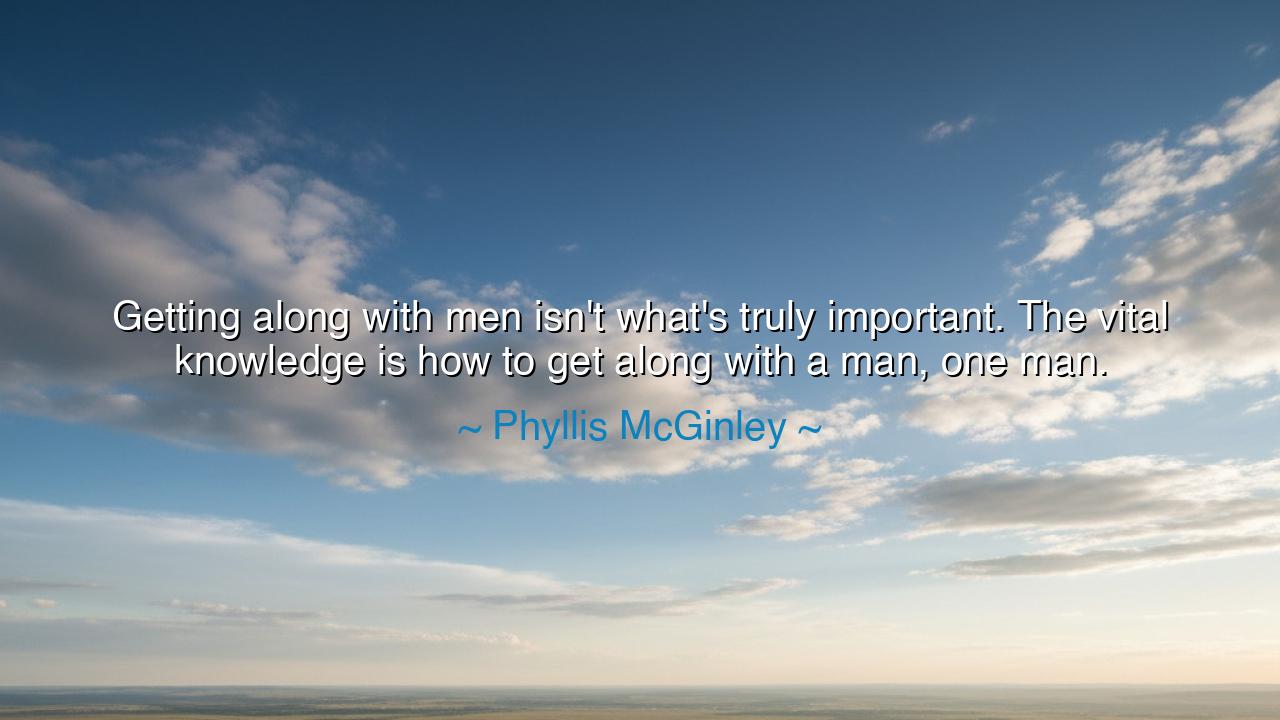
Getting along with men isn't what's truly important. The vital
Getting along with men isn't what's truly important. The vital knowledge is how to get along with a man, one man.






“Getting along with men isn’t what’s truly important. The vital knowledge is how to get along with a man, one man.” So wrote Phyllis McGinley, the poet of domestic grace, the laureate of the ordinary miracle that is love between two souls. In these words, she speaks not of submission, nor of conquest, but of the sacred art of understanding — the patient, quiet, luminous understanding that binds two lives together in a world that is often restless and loud. Her words are not about gender, but about human connection, about the difference between charming the crowd and cherishing the one.
To “get along with men” is to master the outer world — to know how to speak, how to please, how to win favor or admiration. But to “get along with a man,” McGinley says, is something deeper, rarer, holier. It is to walk with one person through the long pilgrimage of life — through silence and laughter, through storms and sunlight, through the shifting seasons of the heart. It is to learn the hidden dialect of another soul and to make it your own, to discover that true love is not found in being adored by many, but in being truly known by one.
McGinley wrote in an age when the world was changing — when women were stepping forth into new freedoms, and yet the hearth still glowed with the old warmth of home. She understood that wisdom does not lie in rejecting love’s small, patient work, but in embracing it as one of life’s highest callings. For it is easy to live for applause, but difficult to live for understanding; easy to impress strangers, hard to forgive and grow beside one person day after day. The poet saw that the deepest knowledge a person can possess is not of things or theories, but of the human heart.
Consider the life of Eleanor Roosevelt, who walked beside Franklin not as an ornament but as a partner in struggle and spirit. Their marriage was not one of unbroken harmony, but of growth — two souls learning, often painfully, how to walk together through history’s fire. Eleanor did not live to please men; she lived to understand one man, and through that understanding, came to understand the world. Their union was not a tale of perfection, but of perseverance — of finding strength in patience, dignity in difference, and love in loyalty.
For McGinley’s truth is this: love is not a matter of many, but of one. The world teaches us to seek popularity, charm, conquest — but the soul seeks intimacy, unity, the quiet knowing that can exist only between two hearts that have weathered life together. The one who can live truly beside another — who can share joy and endure grief, who can argue without hatred and forgive without pride — that one has learned what no scholar or philosopher can teach. The vital knowledge, as McGinley calls it, is not written in books; it is written in shared lives.
This lesson is not only for lovers, but for all who wish to understand the nature of true relationship. Whether between friends, partners, or kin, the art of “getting along with one” requires humility, empathy, and the courage to stay when storms arise. It asks that we listen more than we speak, that we yield without surrendering our soul, and that we build trust not in words alone, but in the quiet consistency of daily kindness. To “get along with one” is to see the divine in another human being and to honor it, again and again, despite the flaws that time will reveal.
So, dear listener, do not chase the fleeting favor of the many. Do not measure your worth by how well you get along with the world. Seek instead the sacred craft of harmony with the one — the friend, the beloved, the companion whose soul meets yours in truth. Tend to that bond with reverence, for in it you will learn patience, forgiveness, and love’s most enduring form: understanding.
And remember this teaching of Phyllis McGinley: the world’s applause fades, but the quiet accord of two hearts endures. To be loved by one person in full honesty is a far greater triumph than to be admired by a thousand in passing. Nurture that union, guard it with gentleness and humility, and you will have discovered not only love — but wisdom itself.






AAdministratorAdministrator
Welcome, honored guests. Please leave a comment, we will respond soon